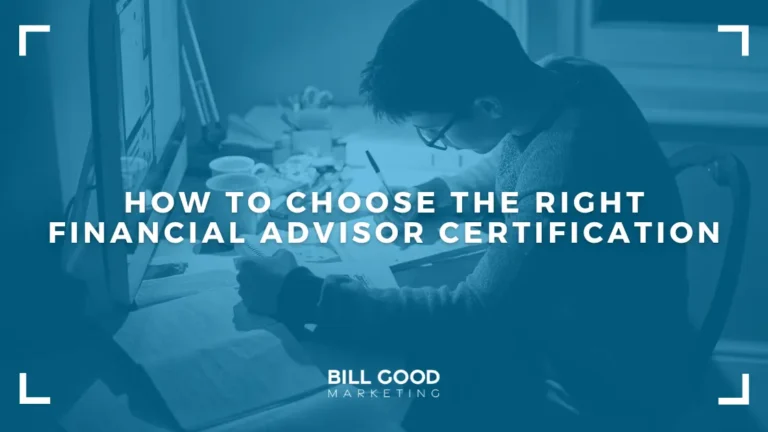Imagine walking into a room filled with financial advisors. Each one has a story, a strategy, and—most importantly—a few letters trailing their name. CFP® mark, CFA®, CPA, ChFC, CIMA… It’s like a bowl of alphabet soup, but instead of carrots and peas, you’ve got credentials and career-defining expertise.
You pause.
“Do I need one of those to stand out? Which one will get me closer to my goals—or, more importantly, my clients’ goals?”
Here’s the thing: There are really two ways you can look at designations. One – they are recognized by investors as showing you have expertise. Two – they actually give you expertise. They’re a badge of honor, a signal to your clients that you’ve done the work, walked the walk, and are ready to deliver financial advice with integrity and expertise.
But not all certifications are created equal. Some will make you a master of personal financial planning. Others will help you dive deep into the world of portfolio management, risk strategies, or even niche areas like retirement income or life insurance.
This isn’t just about padding your business card—it’s about choosing the right path for your career, your passions, and your clients. And with so many certifications to choose from, the question isn’t “Should I get one?” It’s “Which one fits me best?”
Let’s decode the alphabet soup, simplify the decision-making process, and get you on the path to not just any certification—but the right certification. Because when it comes to standing out in this industry, it’s not just about being another advisor. It’s about being the advisor.

What Are Financial Designations?
In the world of financial advisors, designations are like keys. Not just to doors—but to entire hallways of opportunity. Each credential you earn doesn’t just unlock a new skillset; it opens a door to a deeper level of trust with your clients. But here’s the catch: not all keys are the same, and not all doors lead to the same room.
Let’s get real for a moment. You’ve seen these more popular acronyms: CFP® mark, CFA®, CPA, ChFC, CIMA. They look impressive (and they are), but they can also feel like an overwhelming code to crack. Do you need all of them? Are they all worth your time, effort, and late-night study sessions fueled by questionable amounts of coffee?
Think of designations as the toolkit for your career.
A CFP® certification tells the world you’re a financial planning genius—master of everything from estate planning to retirement strategies.
A CFA®? You’re fluent in the language of portfolio management and asset allocation, the kind of advisor institutional investors dream about.
But here’s the thing most advisors don’t think about: your clients don’t care about the letters themselves.
They care about what those letters mean for them.
Can you help them retire early? Save on taxes? Turn their dreams into actionable goals? That’s the real power of a financial certification—it’s not just about what you learn, but about how you use it to create value.
So, before you dive headfirst into getting any old designation, ask yourself this: What door do you want to unlock? What value do you want to bring to your clients? Because the best credential isn’t just the one that looks good—it’s the one that takes you exactly where you want to go.

Where to Start: Key Certifications for Financial Advisors
The financial industry is a landscape of possibilities, and your certifications are your compass. Each one points to a different destination—whether it’s personal financial planning, portfolio management, or tax strategy.
The question isn’t “Should I get certified?”
It’s “Which certification will take me where I need to go?”
Let’s break it down.
Chartered Financial Consultant® (ChFC®)
We like to think of the ChFC® as the toolkit. Offered by The American College of Financial Services, this certification is built for those who want to go beyond the basics of financial planning. With a focus on behavioral finance, annuities, and retirement income, the ChFC® prepares you to tackle complex client needs.
Unlike some certifications, the ChFC® isn’t a single exam. Instead, you’ll complete in-depth coursework tailored to real-world financial challenges and related examinations. It’s perfect for advisors who want to specialize in personal finance while avoiding the exam-day jitters.
Another great thing? The ChFC® prepares you to sit for the CFP® exam. If the ChFC® is the toolkit, the CFP® certification is a Swiss Army Knife. If your goal is to get the CFP® certification, we recommend starting with the ChFC®.
Each of these certifications offers a unique path to success. The key is to choose the one that aligns with your goals, your strengths, and—most importantly—the needs of your clients. Because at the end of the day, your certifications aren’t just about you. They’re about the value you bring to the people who trust you with their financial futures.
CERTIFIED FINANCIAL PLANNER®
We think of the CFP® certification as the Swiss Army knife of designations because it is versatile, comprehensive, and incredibly valuable. As one of the designations most recognized by investors, this program demonstrates a great standard of excellence to your target clients. If your passion lies in helping clients map out their financial lives—from retirement planning to estate planning—this is your golden ticket.
To earn the CFP® designation, you’ll need to complete coursework, meet the CFP Board’s education requirements, and pass a rigorous exam. The process also involves work experience and a commitment to the CERTIFIED FINANCIAL PLANNER® Board of Standards’ code of ethics. Why does this matter? Because clients aren’t just trusting you with their money—they’re trusting you with their dreams.
A CFP® designation sets you apart as a fiduciary, someone who puts their clients’ interests first. That’s the kind of trust that turns a client into a lifelong advocate. If your goal is to master personal financial planning and deliver exceptional financial advice, this designation is a must.
Chartered Financial Analyst® (CFA®)
Now, let’s say you’re less about planning and more about performance. You love numbers, market trends, and the challenge of building investment strategies. Enter the CFA®.
Offered by the CFA Institute, this certification is the gold standard for portfolio management and asset allocation. The program is a marathon, not a sprint—three levels of exams, a steep learning curve, and at least four years of professional experience. But once you’re done? You’ll join an elite group of financial professionals who speak the language of the markets fluently.
CFA® charter holders are known for their expertise in risk management and ethical standards. If your ambition lies in working with high-net-worth clients or institutions or focusing on managing portfolios as part of a team, the CFA® designation is your passport to the big leagues.
Accredited Investment Fiduciary® (AIF®)
It used to be that the word fiduciary didn’t mean all that much to the average investor. Now, as one of the top questions to ask your financial advisor, it is highly sought after. What better designation than the Accredited Investment Fiduciary, then?
While many look at this designation as for group retirement plans, it is meant to ensure you have the systems and processes in place to ensure you are caring for every client in the best way for them and grow your practice.
The good news? If you got the CFP® designation first, this course gives you 7 hours of CE credit towards your requirements. Also, training typically only takes 20 hours of study time to pass the test.
Certified Public Accountant (CPA) and Personal Financial Specialist (PFS)
Numbers tell a story, and as a CPA, you become the storyteller. This designation, awarded by the AICPA, is ideal if you want to specialize in tax planning or complex accounting. Add the PFS certification, and you’re diving into personal financial planning—a powerful combination that allows you to guide clients through the intricacies of their financial lives.
The path to a CPA involves intensive education requirements, exams, and professional experience. It’s not for the faint of heart, or every advisor for that matter, but if your clients are business owners or individuals with intricate tax needs, it’s a designation that commands respect and opens doors.

The Add-Ons: Specialization and Advanced Certifications
Once you’ve laid the foundation with a primary certification like the CFP® certification, the question becomes: How do you set yourself apart in a crowded field? The answer lies in specialization. Advanced certifications are your chance to hone in on specific client needs, expand your expertise, and make yourself indispensable to a niche market.
Here are the certifications that can take your career from good to extraordinary:
Certified Investment Management Analyst® (CIMA®)
Let’s say you’re already great at advising clients, but you’re ready to focus on high-net-worth individuals and institutions with your investment management prowess (but not quite to the level of a CFA®). The CIMA® is your gateway. Offered by the Wealth Institute®, this credential dives deep into asset allocation, risk management, and portfolio construction.
The program emphasizes ethical standards and includes rigorous education requirements, ensuring that advisors aren’t just technically skilled but also trustworthy. CIMA® holders are often sought after by firms managing large accounts, thanks to their proven expertise in navigating complex financial landscapes. If you’re looking to elevate your career and work with sophisticated investors, the CIMA® is worth the investment.
Chartered Life Underwriter® (CLU®)
Think of the CLU® as the go-to certification for life insurance specialists. It’s perfect for advisors who want to address client concerns about estate planning, family wealth, and business succession. Administered by The American College of Financial Services®, the CLU® prepares you to guide clients through sensitive, long-term decisions with confidence.
The coursework is focused on everything from annuities to financial advice and even tax planning. Whether you’re working with individuals or business owners, the CLU® ensures you’re equipped to tackle their most pressing concerns about financial security and legacy.
Certified Private Wealth Advisor® (CPWA®)
Advising high-net-worth and ultra-high-net-worth clients isn’t just about managing money; it’s about understanding their unique challenges. The CPWA® certification, awarded by the Investments & Wealth Institute®, focuses on issues like tax strategies, behavioral finance, and succession planning. But, it doesn’t just stop there. It is about connecting all these different aspects of the ultra-high-net-worth family and combining them to work together. It’s designed for advisors who work with ultra-wealthy clients and want to become trusted partners to achieve their financial goals.
The program requires candidates to meet strict prerequisites, including several years of professional experience and extensive coursework. But for those who want to establish themselves as leaders in the wealth management space, the CPWA® is a game-changer.
Retirement Income Certified Professional® (RICP®)
Retirement is one of the biggest financial milestones your clients will face. The RICP® prepares you to guide them through it, with expertise in retirement planning and retirement income strategies. Offered by The American College of Financial Services®, this designation focuses on turning assets into sustainable income streams that can last a lifetime.
From Social Security to annuities, the RICP® equips you to answer the critical questions your clients have as they transition from earning to living off their investments. If your client base skews toward retirees or pre-retirees, this certification is a must.
Certified Fund Specialist® (CFS®)
If mutual funds are your focus, the CFS® is your ticket to mastery. Offered by the Institute of Business and Finance (IBF), this certification dives deep into the world of mutual funds, covering topics like portfolio theory, dollar-cost averaging, and annuities.
Holders of the CFS® designation often advise clients on mutual fund selection, and if properly licensed, they can even buy and sell funds for their clients. This credential not only sharpens your expertise in a critical investment vehicle but also positions you as a go-to advisor for clients seeking guidance in this space.
These advanced certifications aren’t just credentials—they’re opportunities to redefine your career. By specializing, you’re not only sharpening your skills but also positioning yourself as an expert who can deliver exactly what your clients need. And in a world where trust and expertise are everything, that’s the ultimate differentiator.
Next, we’ll compare these certifications head-to-head, so you can decide which one aligns best with your goals and your clients’ needs. Let’s dive in.

Comparing Professional Designations
So, you’ve got a buffet of certifications in front of you—each promising to elevate your career. But how do you choose the one that fits your goals, strengths, and the kind of clients you want to serve? It’s not just about which certification looks best on paper; it’s about finding the one that aligns with your vision and makes you indispensable.
Let’s break it down by what matters most:
Education Requirements and Prerequisites
Every certification starts with learning, but not all learning paths are the same.
The CFP® Board requires a bachelor’s degree, comprehensive coursework, a commitment to ongoing education, among other requirements such as years of experience within the industry.
The CFA Institute takes it up a notch with an intensive three-level exam process that demands hundreds of hours of study.
Certifications like the CPA require state-specific licensing and specialized exams in tax planning and accounting, while the RICP® offers a focused curriculum on retirement income strategies. If you’re looking for a certification program that matches your current expertise and future goals, start by evaluating the prerequisites.
Ask yourself: Do you have the time to commit to a rigorous education program? Does the certification build on the skills you already have, or does it push you into new territory?
Professional Experience
Some certifications, like the CFP® designation and CPA, require candidates to have years of work experience under their belts. Others, like the CIMA®, are designed for seasoned advisors working with high-net-worth clients.
These requirements aren’t just hoops to jump through—they’re a way to ensure you’re ready to apply what you’ve learned in real-world scenarios. If you’re already advising clients on financial planning or managing portfolios, you might meet the professional experience criteria for advanced certifications like the CPWA®.
Pro Tip: Certifications that demand experience aren’t barriers—they’re bridges. They ensure you’re not just learning for learning’s sake but to deliver meaningful value to your clients.
Continuing Education Requirements
The financial industry is a moving target. Markets evolve, regulations shift, and client expectations grow. That’s why many certifications—like the CIMA® and the CFP® designation—require ongoing continuing education.
These requirements aren’t just about maintaining your credentials. They’re about staying sharp, current, and ready to deliver financial advice that meets today’s challenges. If you’re someone who thrives on lifelong learning, these certifications will keep you engaged and ahead of the curve.
Specialization Areas
Every certification has its niche. The CFP® designation shines in holistic financial planning, while the CFA® is a beacon for those drawn to portfolio management and asset allocation. If your focus is on life insurance or estate planning, the CLU® is unmatched, and for those working with retirement income, the RICP® offers a laser-focused approach.
Key Takeaway: Look at your client base and ask: What problems do they need solving? What areas of expertise will make you the investment adviser they turn to, time and time again?
Ethical Standards
In a world where trust is currency, certifications that emphasize ethical standards—like the CFP® certification, AIF®, and CIMA®—are invaluable. Adhering to a code of ethics isn’t just about compliance; it’s about signaling to your clients that their interests come first.
If you’re looking to build long-term relationships based on integrity, choose a certification that requires you to commit to the highest standards of conduct.
Choosing the right certification isn’t just a career decision; it’s a declaration of who you are as a financial professional. Are you the advisor who meticulously plans every detail of a client’s financial future? The one who thrives on analyzing markets and crafting investment strategies? Or the expert who helps families secure their legacy?
The path you choose will define the value you bring—not just to your clients, but to the industry as a whole.

Advantages and Disadvantages of Financial Certifications
Certifications are powerful tools. They open doors, build trust, and position you as an expert in a sea of generalists. But every tool has its trade-offs. The question isn’t whether certifications are worth it—it’s whether they’re worth it for you.
Let’s explore the pros and cons.
Advantages
- Credibility and Trust: Letters like CFP® designation or CFA® after your name signal expertise and dedication. Clients see those credentials and know they’re working with someone accredited by rigorous standards. Ethical standards and fiduciary responsibilities enhance your reputation further.
- Higher Earning Potential: Certifications like the CIMA® and CPA can significantly increase your income. Advisors with specialized designations often attract high-net-worth clients who are willing to pay for expertise in areas like tax planning or portfolio management.
- Specialization and Differentiation: Whether it’s estate planning with a CLU® or retirement income strategies through an RICP®, certifications let you carve out a niche and stand out in a competitive market.
- Knowledge and Skill Development: Each certification comes with in-depth coursework and practical applications, from asset allocation to behavioral finance. You’re not just earning letters—you’re gaining tools to better serve your clients.
Disadvantages
- Time Commitment: Certifications like the CFA® can require thousands of hours of study. Combine that with work experience requirements, and you’re looking at a multi-year journey.
- Cost: From education programs to exam fees, certifications aren’t cheap. Factor in the continuing education requirements needed to maintain them, and the investment adds up quickly.
- Not One-Size-Fits-All: Not every certification aligns with every career path. If you’re focused on financial planning, a CFA® might not serve you as well as a CFP® designation. Choosing the wrong certification can feel like spinning your wheels.
- Perception vs. Practicality: While certifications open doors, they aren’t the whole story. Clients care more about how you solve their problems than the letters on your business card.
Certifications are a way to invest in yourself and your future, but like any investment, they need to align with your goals and strategy. If you’re ready to commit to the journey, the rewards can be transformative—not just for your career, but for the clients who trust you with their financial futures.
In the next section, we’ll help you decide how to choose the certification that’s right for you. Because the best designation is the one that takes you exactly where you want to go. Let’s keep moving.

How to Choose the Right Certification
Simple: Start with your goals, then match them to the certification that opens the right doors.
Step 1: Define Your Career Goals
What kind of advisor do you want to be? If your passion lies in financial planning, the CFP® designation will equip you to create holistic strategies for your clients’ retirement planning and estate planning. If you’re drawn to portfolio management and analyzing asset classes, the CFA® might be your path.
Pro Tip: Focus on your clients’ needs. Are they looking for tax planning expertise? High-net-worth wealth strategies? Or someone who can guide them through life insurance decisions? Your ideal certification aligns with the problems you solve best.
Step 2: Evaluate the Requirements
Every certification has its demands. The CFP® Board requires work experience, a bachelor’s degree, and ongoing continuing education requirements. The CFA Institute tests your endurance with three grueling exam levels.
Do you have the years of experience or the time to commit to rigorous coursework? If not, consider certifications like the ChFC®, AIF® or CLU®, which offer more flexible paths.
Step 3: Consider Specialization
Certifications let you carve out a niche:
- CPWA® or CIMA®: Perfect for advisors working with high-net-worth clients on asset allocation and risk management.
- RICP®: Ideal if your clients are focused on retirement income and turning savings into sustainable cash flow.
- CLU®: The go-to for life insurance and estate planning.
Specialization isn’t just about expertise—it’s about differentiation. The right certification positions you as the trusted expert in a specific field.
Step 4: Look at the Long-Term ROI
Certifications are investments. A CFP® designation or CPA may cost you time and money now, but they can lead to higher income, better clients, and long-term career growth. Certifications like the CPWA® and CIMA® often attract ultra-wealthy clients, creating opportunities for higher advisory fees.
Step 5: Align with Ethical Standards
Certifications that emphasize ethical standards—like the CFP® designation, AIF®, and CIMA®—enhance your reputation. These aren’t just about compliance; they show clients that you’re committed to their success.
The best certification isn’t just the one that looks good—it’s the one that fits your goals, your clients, and your career path. Choose wisely, and the right letters after your name will speak volumes about who you are and the value you deliver.

How Bill Good Marketing Helps Financial Advisors Succeed
Choosing the right certification isn’t just about adding letters to your name—it’s about transforming the way you serve your clients, grow your business, and define your legacy as an advisor. But certifications are just one piece of the puzzle.
Success in this industry also requires the right systems, the right strategies, and the right support.
That’s where we come in.
At Bill Good Marketing, we’ve spent over 45 years helping financial advisors do what they do best: build meaningful relationships with clients, grow their AUM, and achieve sustainable business success. Whether you’re just starting your certification journey or are a seasoned professional looking to expand your expertise, we provide the tools and guidance to make your hard-earned credentials work harder for you.
Our system goes beyond marketing. It’s about helping you connect the dots—turning your certifications into credibility, your expertise into action, and your goals into reality. From personalized content libraries that deepen client relationships, to strategies that attract the high-net-worth prospects you want, we make sure you have everything you need to not just survive but thrive.
Because at the end of the day, certifications matter. But what truly sets you apart is how you use them to deliver value, inspire trust, and make a difference in your clients’ lives. And that’s a journey we’d be honored to take with you.
Ready to take the next step? Contact us today to learn how we can help you turn your credentials into success and grow your practice like never before.




